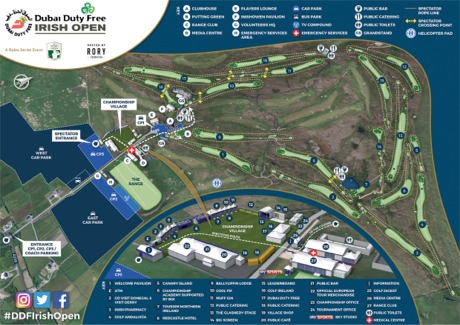|
|
Key facts about the Dubai Duty
Free Irish Open
28.06.18
|
WITH the 2018 Dubai
Duty Free Irish Open teeing off at Ballyliffin Golf
Club next week (July 5-8), here are some interesting
facts that you probably didnít know about the event
and its illustrious 91 year history. |
- The first ever
Irish Open tournament was held in 1927 when
Scotsman George Duncan lifted the trophy at
Portmarnock in Dublin.
- This yearís
event at Ballyliffin Golf Club is the first time
the tournament has ever been hosted in Donegal,
a county famous for its natural breath-taking
beauty and deemed the ĎCoolest Place on the
Planetí by National Geographic only last year.
- As one of eight
European Tour events which make up the
prestigious Rolex Series, the prize fund for
this yearís Dubai Duty Free Irish Open is a
whopping US$7 million, compared to the princely
sum of approximately £750 in 1927 when winner
George Duncan pocketed a cool £150.
|
 |
|
To view the
Full Size Site
Map Click Here
. |
- Ballyliffin
Golf Club consists of two outstanding,
contrasting links courses. The Glashedy Links,
on which the Dubai Duty Free Irish Open will be
played, is a Pat Ruddy and Tom Craddock
masterpiece, rated amongst the best links tracks
in the world.
- Jon Rahm is
aiming to become the sixth Irish Open champion
to successfully defend his title. Nick Faldo
holds the record for consecutive wins with three
in a row from 1991 to 1993. The only other
players to achieve back-to-back wins are Spanish
legend Seve Ballesteros (1985-86), Scotsman
Colin Montgomerie (1996-97), Welshman Ian
Woosnam (1988-89), and Englandís Mark James
(1979-80).
- The biggest
winning margin in an Irish Open was in 1987 when
Bernhard Langer finished 10 shots ahead of the
field at Portmarnock. Last year Jon Rahmís
margin of victory was six shots.
- Jon Rahmís
winning 72-hole score of 264 is the lowest in
Irish Open history, beating the previous record
of 266 that was jointly held by Colin
Montgomerie (Fota Island, 2001) and Ross Fisher
(Killarney, 2010). Rahmís score of -24 was also
the lowest ever recorded in relation to par,
beating Christy OíConnor Jnrís 21-under 275 in
1975 at Woodbrook.
- In 2009 at
Baltray, a 22-year-old Shane Lowry from County
Offaly became the only amateur ever to win the
Irish Open Ė and the third amateur to win a
European Tour event. As an amateur, Shane received
no prize money for his historic win but it
proved a springboard for a very successful
professional career.
- One record that
last yearís champion Rahm did not beat was the
lowest 18-hole score of 61 in an Irish Open.
This feat was accomplished by Northern Irelandís
Graeme McDowell at County Louth in 2009 and
again the following year by Englandís Ross
Fisher when he won the tournament at Killarney
in 2010. However, G-Macís score was 11-under
par, compared to Fisherís 10-under.
- The Dubai Duty
Free Irish Open is one of the qualifying events
for The Open Championship. The leading three
players who have not already qualified and who
finish in the top ten qualifying for this yearís
Open at Carnoustie.
- In 2012, Royal
Portrush became the first Northern Ireland
course in more than 50 years to host the event Ė
setting a new record as the first European Tour
event to sell out prior to play on all four
days. A record European Tour attendance of
112,000 over four days (and 131,000 over six
days) watched as Welshman Jamie Donaldson was
crowned champion, likening his experience to
playing in a major championship.
- Only seven
Irish players have lifted their national Open
trophy. The most recent was Rory McIlroy who won
the title in such spectacular fashion at The K
Club in 2016. Other Irish winners are Fred Daly
in 1946, Harry Bradshaw in 1947 and 1949,
Christy OíConnor Jnr in 1975, John OíLeary in
1982, Padraig Harrington in 2007 and Shane Lowry
in 2009.
- Amongst the
golfing stars that will be challenging Jon Rahm
for his title at Ballyliffin are tournament host
Rory McIlroy, Thomas Pieters, Rafa Cabrera Bello,
Paul Dunne, Matt Fitzpatrick, Shane Lowry, Danny
Willett, Graeme McDowell, Chris Wood, Padraig
Harrington, Darren Clarke, Alexander Levy and
ThorbjÝrn Olesen.
|
|

